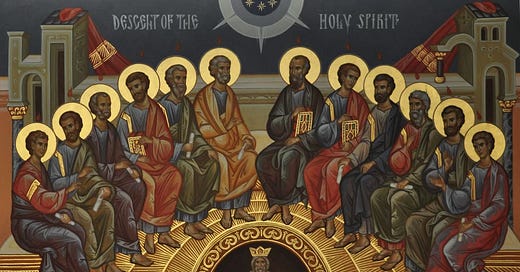As with Easter and its seven-week season, a special sequence hymn is appointed for Pentecost, also known as Whitsunday. Sequence hymns are appointed to be sung for specific days and seasons throughout the Church Year, and speak to the theme of the day or season for which they are appointed. Sequence hymns, also known as proses, are important because they anchor the Church’s worship on the Gospel-centered feasts and festivals celebrated throughout the year.
Most sequence hymns used in the Western Church were written between 800-1200 A.D., and were in widespread use for centuries. Following the Reformation, the Roman Catholic allegedly restricted the use of sequence hymns, allowing only four to be sung throughout the year. The Lutheran Church, however, in keeping with the larger tradition of the Western Church, continued to use dozens of sequence hymns in worship.
Veni, Sancte Spiritus, the sequence appointed for Pentecost Sunday, beautifully demonstrates the work of the Third Person of the Trinity, who was first given to the Church of the Apostles following Christ’s Ascension. It speaks of the Spirit’s role in sanctification, and offers a prayer that He would come to the Church.
The Lutheran Reformers referred to this well-known sequence hymn in the fight over good works, demonstrating that Lutherans held to the orthodox teachings of the Church concerning good works. “Where Thou art not” is a wonderful demonstration that good works cannot be done apart from the Spirit, and that they are an integral and necessary aspect of the Spirit’s work and of the Christian life.
Below is the common (and beautiful) English translation, for use before the Holy Gospel following the Alleluia:
Come, Thou Holy Spirit, come,
And from thy celestial home
Shed a ray of light divine;Come, Thou Father of the poor,
Come, Thou source of all our store,
Come, within our hearts to shine.Thou of comforters the best,
Thou the soul's most welcome guest,
Sweet refreshment here below;In our labor rest most sweet,
Grateful coolness in the heat,
Solace in the midst of woe.O most blessed Light divine,
Shine within these hearts of Thine,
And our inmost being fill;Where Thou art not, man hath naught,
Nothing good in deed or thought,
Nothing free from taint of ill.What is soiled make Thou pure;
What is wounded, work its cure;
What is parched, fructify;What is rigid, gently bend;
What is frozen, warmly tend;
Strengthen what goes erringly.On the faithful, who adore
And confess Thee, evermore
In thy sevenfold gifts descend:Give them virtue's sure reward,
Give them thy salvation, Lord,
Give them joys that never end.
The Latin translation, for those who read/speak Latin:
Veni, Sancte Spiritus,
et emitte caelitus
lucis tuae radium.
Veni, pater pauperum,
veni, dator munerum,
veni, lumen cordium.
Consolator optime,
dulcis hospes animae,
dulce refrigerium.
In labore requies,
in aestu temperies,
in fletu solatium.
O lux beatissima,
reple cordis intima
tuorum fidelium.
Sine tuo numine,
nihil est in homine,
nihil est innoxium.
Lava quod est sordidum,
riga quod est aridum,
sana quod est saucium.
Flecte quod est rigidum,
fove quod est frigidum,
rege quod est devium.
Da tuis fidelibus,
in te confidentibus,
sacrum septenarium.
Da virtutis meritum,
da salutis exitum,
da perenne gaudium.




